"This collection brings together textual commentaries on thirty representative works of literature in Portuguese - either complete poems or extracts from longer works - ranging from the medieval lyric of the 13th century, through the poetry and drama of the Portuguese Renaissance, the great Realist novels of the nineteenth century, early twentieth century Modernism and post-1974 writings through to the present day, while also including examples of 19th- and 20th- century Brazilian literature. The authors chosen - poets, dramatists and novelists - are generally regarded as iconic writers, and the three most famous canonical Portuguese authors (Luis de Camoes, Fernando Pessoa, Jose Saramago) are featured, but the texts selected for commentary strike a balance between a focus on well-known and lesser-studied works. All the primary texts are reproduced in Portuguese, sometimes in original editions, with English translations added for the majority. The contributors variously explicate and contextualise the works they present, some focusing on hidden meaning, others on philological aspects of editing, others on their historical, intellectual and philosophical context, and others still on the process of translation itself. All, however, aim to develop the art of reading, for the benefit of scholars and students alike. Stephen Parkinson and Claudia Pazos Alonso are members of the Sub-Faculty of Portuguese at Oxford University, and editors of the Companion to Portuguese Literature (Tamesis, 2009)."
Autorentext
Claudia Pazos Alonso
Inhalt
Introduction: Commentaries in Honour of Tom Earle 1. How to Eat a Spider: Alfonso X Cantiga de Santa Maria 2. A Tela da Dam: Estevam Coelho: 'Sedia la fremosa' 3. 'Sou a triste, sem mezinha': Microvariações em torno do Auto da Alma: Gil Vicente Auto da Alma 4. It takes one to know one - o reconhecimento de judeus em cena: Francisco Sá de Miranda Os Vilhalpandos 5. A Voice Crying Out in the Wilderness: Francisco Sá de Miranda: 'Montano' 6. The English Reception of Sá de Miranda: Francisco Sá de Miranda 'O sol é grande' 7. Swansong: Luís de Camões 'O cisne, quando sente ser chegada' 8. O canto poético camoniano como epitáfio: Luís de Camões 'Cara minha inimiga, em cuja mão' 9. 'Transforma-se o amador na cousa amada' texto e contexto: Luís de Camões 'Transforma-se o amador na cousa amada' 10. Todos juntos seguiram dom Francisco': Jerónimo Corte-Real Sucesso do Segundo Cerco de Diu 11. Trent, Bait, and Deceit: Vasco Mousinho de Quevedo: 'Às Relíquias de S. Cruz de Coimbra' 12. Conflict Resolution: Francisco Rodrigues Lobo: A Primavera 13. A Sonnet by the Marquise of Alorna: Leonor de Almeida Portugal: 'A uma Senhora que principiava a fazer versos' 14. Intimismo e comunidade galego-portuguesa: Rosalia de Castro: 'Dend' as fartas orelas do Mondego' 15. Libaninho: Eça de Queirós: O Crime do Padre Amaro 16. The Opening of A Ilustre Casa de Ramires and Oliveira Martins's Theories on Portuguese History: Eça de Queirós: A Ilustre Casa de Ramires 17. Translating Eça: An extract from Eça de Queirós: 'Um poeta lírico' 18. Small holocausts: the devastation of the self: Camilo Pessanha: 'Quem poluiu, quem rasgou os meus lençóis de linho' 19. A Sonnet from the English: Fernando Pessoa: 'Antígona' 20. Haunting Pianos: Pessoa and D. H. Lawrence: Bernardo Soares: Livro do Desassossego 21. Crimes and Confessions: Mário de Sá-Carneiro: A Confissão de Lúcio 22. Watch this Space: Florbela Espanca: 'Esfinge' 23. Recoding the Colonial Borders: Maria Isabel Barreno, Maria Teresa Horta, and Maria Velho da Costa: Novas Cartas Portuguesas 24. A Harvest Raised from the Text: José Saramago: Levantado do Chão 25. The Art of Seeing Queerly: Al Berto: 'Truque do Pêssego' 26. Interracial Intimacy as Site of Colonial Re-visioning: Lídia Jorge: O Vento Assobiando nas Gruas 27. Mignon's Song: Antônio Gonçalves Dias: 'Canção do exílio' 28. Mechanisms of Memory: Graciliano Ramos: Infância 29. Severino's Voice: João Cabral de Melo Neto: Morte e Vida Severina 30. The End, or is it?: Clarice Lispector: A Hora da Estrela
